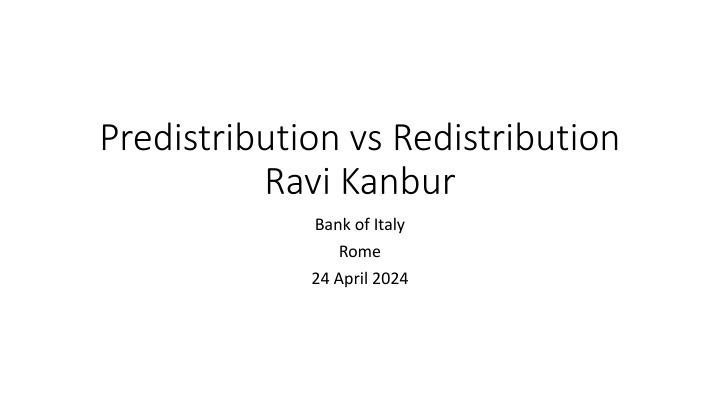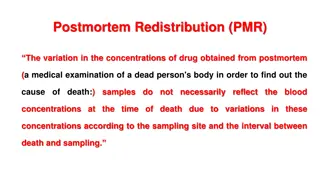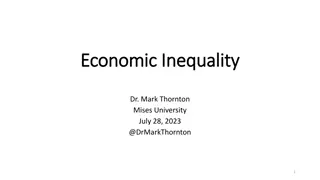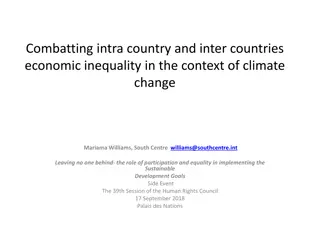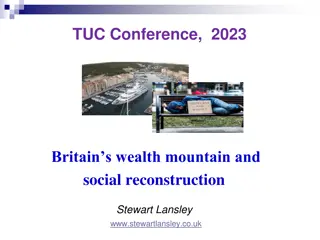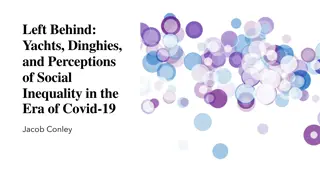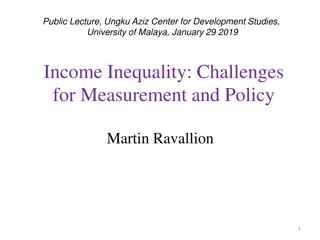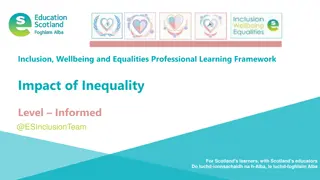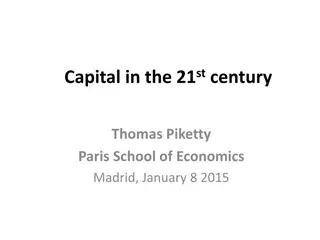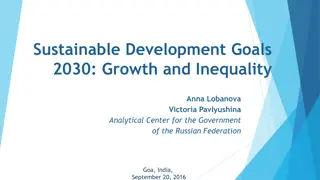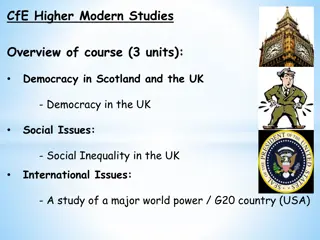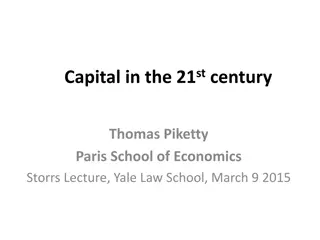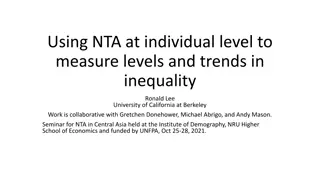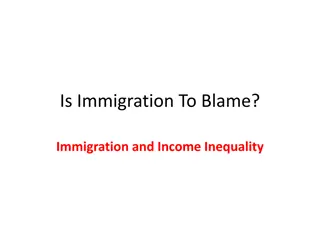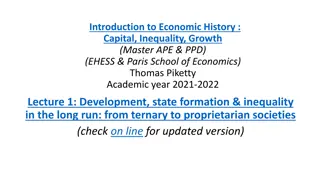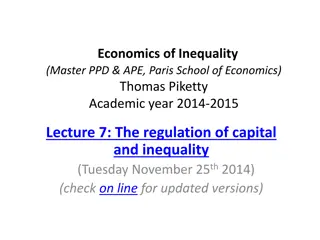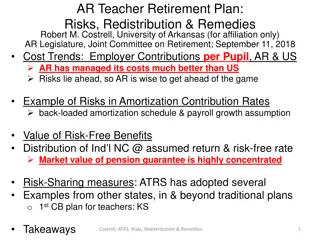Examining the Shift from Redistribution to Predistribution in Addressing Inequality
This presentation delves into the shift from redistribution to predistribution in addressing market inequality by focusing on enhancing human capital and income earning capacities before individuals enter the market. It discusses the current trend in analytical literature and policy discourse, emphasizing the importance of investments to equalize pre-market human capital. The discussion highlights how predistribution policies can be more effective than traditional redistribution methods in combating inequities, especially in low-income countries.
Download Presentation

Please find below an Image/Link to download the presentation.
The content on the website is provided AS IS for your information and personal use only. It may not be sold, licensed, or shared on other websites without obtaining consent from the author.If you encounter any issues during the download, it is possible that the publisher has removed the file from their server.
You are allowed to download the files provided on this website for personal or commercial use, subject to the condition that they are used lawfully. All files are the property of their respective owners.
The content on the website is provided AS IS for your information and personal use only. It may not be sold, licensed, or shared on other websites without obtaining consent from the author.
E N D
Presentation Transcript
Predistribution vs Redistribution Ravi Kanbur Bank of Italy Rome 24 April 2024
The Issue In this presentation I want to examine the roots of what I see as a trend in the analytical literature and policy discourse of the last quarter century. There is a disenchantment with redistribution through progressive income taxation and transfers to address market inequality, and a turn towards what has been termed predistribution addressing inequality of human capital and income earning capacity that individuals bring to the market in the first place.
Here is how the then Labour Party Leader Ed Miliband (2012) presented it to a general audience in a political setting: "Think about somebody working in a call centre, a supermarket, or in an old peoples' home. Redistribution offers a top-up to their wages. Pre-distribution seeks to go further - higher skills with higher wages. In other words, move away from redistribution (ie equalization of post-market incomes) to predistribution (ie equalization of pre- market human capital).
The political discourse is underpinned by a growing consensus in the academic literature. In their magisterial review of Taxation through the ages, Keen and Slemrod (2022) summarize one of their lessons as follows: But it is important to remember that taxes, even including negative ones in the form of cash benefits, are only one weapon in the policy arsenal for addressing vertical equity, and may not even be the most effective of them. One of the most powerful ways in which governments support the poor especially in low income countries is by providing basic education and health care. By enabling such spending, a not-very progressive tax that raises a lot of revenue such as VAT, can do more for the poor than a very progressive one that raises little.
In a recent review of the academic literature, particularly focused on developing countries, Chico Ferreira (2023) concludes: My reading is that there is a growing consensus on pre-distribution policies, but perhaps less so on re-distribution policies. Pre-distribution refers to public investments intended to enhance the human capital accumulation of the least advantaged Piketty et. al. (2022) echo the same sentiment more generally when they say: policy discussions on inequality should pay more attention to policies affecting pre-tax inequality and should not focus exclusively on redistribution.
Note: My focus here is on predistribution seen in the way Ferreira characterizes it: public investments intended to enhance the human capital accumulation of the least advantaged. Predistribution has also been seen in wider terms, as characterized for example by Hacker (2011): focus on market reforms that encourage a more equal distribution of economic power and rewards even before government collects taxes or pays out benefits. Regulation of monopsony power through minimum wages or support of unions, for example, would also fit this bill. But here I take the route of public investments and human capital
I think there are three underlying arguments which underpin this trend from redistribution to predistribution. First is the accumulation of knowledge about the many issues with taxation of market incomes incentive effects, information costs, implementation and compliance. With this comes the sense that it may be better to redistribute pre-market human capital, even to achieve equality of post market incomes. Second is the argument that it is morally superior to target pre-market income earning capacity because post-market inequality incorporates variations in effort, and individuals have a legitimate moral claim to the outcomes of their effort. Third is the argument that predistribution is an easier political sell than redistribution, perhaps for a combination of the first two reasons.
I believe that each of these arguments can be challenged. At least, they have had a too easy a ride in the analytical literature, and the crystallizing consensus on the shift away from redistribution towards predistribution needs to be examined more closely.
Optimal Income Taxation: The Mirrlees Framework The essence of the economic analysis of income taxation and distribution is present in James Mirrlees s 1971 Nobel prize winning paper, An Exploration in the Theory of Optimum Income Taxation. In the Mirrlees model individuals bring different degrees of exogenously given productivity to the market place and translate it into market income through their choice of labor supply. The government implements an income tax regime, which affects labor supply. The government chooses a tax regime to maximize an objective function defined on individual wellbeings, subject to the constraint of respecting individual choices and the constraint of raising a given amount of revenue.
This classic paper has all the ingredients to make it a quintessentially economic analysis. It has individual choices in response to taxation, thus bringing in incentive effects. It has a clear statement of the government s constraints. It has a clear statement of the government s objective function. It has optimization of the objective function subject to the constraints. It provides a framework for thinking about equity and efficiency in discussion of taxation and transfers. It has been hugely influential not only in the analytical realm but directly in the policy discourse, for example in UK decisions on the top rate of marginal tax, via the Mirrlees Review of 2010.
In terms of this framing, a statement of a shift to predistribution means is this: Let us focus more on the distribution of productivities individuals bring to the market (equalize education) not so much on the redistribution of post market incomes. This is a way of interpreting the Keen-Slemrod statement quoted earlier. But in order to conduct a rigorous analysis we now need to extend the basic Mirrlees model to incorporate a theory of how market productivities are themselves produced through say education, and how public inputs combine with private inputs to generate the market productivities.
Actually there are many, by now hundreds, of papers which look at income taxation and funding of education jointly in the Mirrlees optimal taxation framework. These papers use different types of modelling of the education sector, private investment in education, deployment of public expenditure in education, how private inputs and public inputs combine to produce market relevant human capital, parental preferences, intergenerational aspects etc etc.
There are lost of specificities but I would propose one broad summary of the center of gravity of results as they apply to our concerns: There is no strong presumption for the broad narrative that progressivity of income tax should be zero or low to raise revenue in order to finance a progressive public input to education.
Ulph (1977): there seems to be support for the argument that when there is redistribution one uses a more regressive educational system. Fraja (2002): This paper studies the education policy chosen by a utilitarian government ..Households can use private education, but cannot borrow to finance it. The government can finance education with income tax, but at the cost of blunting the individuals' incentive to exert labour market effort. The optimal education policy we derive is elitist: it increases the spread between the educational achievement of the bright and the less bright individuals, compared to private provision.
Balestrino et. al. (2017): Using a household production model of educational choices, we characterise a free market situation in which some agents (high wagers) fully educate their children and spend a sizable amount of resources on them, while others (low wagers) educate them only partially . Redistributive taxation and compulsory education are best seen as complementary policies.
The basic intuitions center on two factors: Once choices are introduced on the education side, there are incentive effects there as well, the relative magnitudes of these compared to labor-leisure choice distortions become important, and these depend on quite specific features of the education production function and the utility functions. Second, if private inputs matter along with public inputs to the final outcome through a human capital production function, then inequality of market income is itself a key determinant of the inequality of human capital.
So Just because redistributing through income taxation is difficult does not mean that redistributing through other avenues is easy. It is not that there are no incentive effects in redistributing education. It is not that state educational expenditures are themselves particularly equally distributed. And the moment we model market relevant human capital as being the product of both public inputs and private parental inputs, the distribution of income is seen to play a key role in the distribution of education and human capital. Thus Predistribution Requires Redistribution (Tuomala et. al. et al 2022). The grass is not greener on the other side. At the very least we need to fully assess the difficulties in other channels before quite so easily advocating a shift away from income redistribution through (positive and negative) taxes.
Non-Utilitarian Objectives The Mirrleesian objective function is Utilitarian--an aggregate of individual utilities. The greatest happiness of the greatest number is the foundation of morals and legislation (Jeremy Bentham). The Mirrleesian twist is that inequality in wellbeing is also part of the objective function. The Mirrlees framework allows a formalization which provides a range of possibilities from simple Benthamite summation of utilities to Rawlsian focus only on the worst off. But now consider the following:
Roemer and Trannoy (2017): In the welfarist tradition of social-choice theory, egalitarianism means equality of welfare or utility. Conservative critics of egalitarianism rightly protest that it is highly questionable that this kind of equality is ethically desirable, as it fails to hold persons responsible for their choices, or for their preferences However, variations in income attributable to factors outside the individual s control, such as Race or Parental Wealth, ARE ethically legitimate targets for redistribution.
This will immediately be recognized as the inequality of opportunity rationale for taxation to redistribute, as opposed to solely inequality of outcomes. The modern revival of this perspective in economics owes much to John Roemer (1998), who coined the terms circumstance and effort for factors respectively outside and inside the control of the individual. It also has a pedigree in moral and political philosophy, going back least to Ronald Dworkin (1981a,b). Indeed, Marxist philosopher Gerry Cohen (1989) lauded Ronald Dworkin for helping egalitarianism by incorporating within it the most powerful idea in the arsenal of the anti-egalitarian right: the idea of choice and responsibility.
The upshot this line of argument is the position that while it is morally legitimate to redistribute the circumstances which individuals bring to the market, it is not legitimate to further redistribute market outcomes (incomes) which are the result of individual effort, choice and responsibility. I believe that this argument, apparently now conceded by many egalitarians as well, has been instrumental in the twenty first century drift away from the impulse to redistribute market incomes and to try something else for example redistributing education. In other words, predistribution.
But I have written elsewhere (Kanbur, 2023) about the empirical difficulties of make the distinction between circumstance and effort in practice in order calculate measures of inequality of opportunity . But consider now some conceptual difficulties of the circumstance/effort distinction.
Consider first the following conundrum. What happens when one person s effort becomes another person s circumstance? The effort doctrine says that the consequences of that effort belong to the individual and we have no moral right to alter those consequences. But the circumstance doctrine says that factors outside an individual s control are a morally legitimate target. Both doctrines cannot be satisfied simultaneously.
The most obvious example of such interconnection is parents and children. If free and full knowledge parental choices lead to a poor start for their children, which doctrine is to rule? The answer is not clear and cannot be given within the philosophical framework of the current equality of opportunity discourse. Biblical injunctions also reflect age old ambiguity on this question. for I, the Lord your God, am a jealous God, visiting the iniquity of the fathers on the children, and on the third and the fourth generations of those who hate Me (Deuteronomy 5:9) "Fathers shall not be put to death for their sons, nor shall sons be put to death for their fathers; everyone shall be put to death for his own sin. (Deuteronomy 24: 16)
Conceptually, any form of social connectedness leads to similar difficulties. An executive s freely chosen decisions lead to the circumstances for the firm s workers. Freely chosen housing decisions of high income individuals lead to rising house prices and rising rents for low income individuals. What Amartya Sen called entitlement failure in his study of the 1943 West Bengal Famine was the freely made market decisions of grain hoarders pushing up food prices, thereby altering the circumstances of artisans and causing famine deaths.
But the conceptual difficulty arises even when there is no social connectedness and we consider individuals in isolation. Imagine yourself serving on a soup line. As one particular indigent approaches you and you reach out with a cup of soup, the equality of opportunity police, the circumstance/effort monitors, step in and inform you that the reason why the indigent is an indigent is not because of circumstance but because of effort and choice. In what moral universe would you pull away the cup of soup?
If your moral intuition recoils from doing that then it is conceding that outcomes can matter irrespective of choice and that at the very least we have to carry with us both moral intuitions. Again, note that acting on the intuition by providing support to the worst outcomes will have incentive effects, but so will acting on the other moral intuition. Or any moral intuition. The point here is to specify the objective function that is to be optimized subject to incentive compatibility and other constraints. A formal axiomatization of accommodating or balancing both intuitions is presented in Hufe, Kanbur and Peichl, Review of Economic Studies 2022.
I have argued elsewhere that these conceptual difficulties significantly undermine the circumstance/effort distinction, quite apart from the empirical difficulties in implementing the distinction in practice (Kanbur and Wagstaff, 2015). But here I would like to say that even if you do not come with me all the way, at least you should question the second argument for the move away from taxation of market incomes for redistribution that it is morally illegitimate because it interferes with the free choices which lead to those incomes.
Political Economy of Predistribution and Redistribution In 2023, philosopher Christine Synpowich published a lead essay in the general readership magazine Boston Review, entitled Is Equal Opportunity Enough? Her answer to the question was: No. But others took issue with her on political economy grounds. Thus educationist Leah Gordon responded: I applaud Sypnowich for reviving attention to equality of results in a manner that is sensitive to the challenges of past efforts. Even so, since outcome- oriented egalitarianism competes with other deeply held American values merit, private property, and a notion of family according to which one should be free to pass privilege to one s children those of us who join Sypnowich in a pluralist, communitarian effort to promote equality of outcome should brace for a fight.
In the same issue, sociologist Claude Fischer wrote: While Americans endorse egalitarianism in rights, dignity, and opportunity, they still want competitions that result in inequality. That fact, along with other realities, calls for modesty in goals and programs. Elsewhere, Alex Raskolnikov of the Columbia Law School argues: Formal equality same rules for the rich and the poor, the strong and the weak is essential to a modern capitalist democracy . [L]eading redistributive policies currently advocated by the left will continue to garner only limited support, while alternative emphasis on predistribution rather than redistribution is likely to succeed both in the short and the long run.
In related vein but through methods more congenial to economists, Kuziemko et. Al. (2023) argue that: .less-educated Americans differentially demand predistribution policies (e.g., a federal jobs guarantee, higher minimum wages, protectionism, and stronger unions), while more-educated Americans differentially favor redistribution (taxes and transfers). They use these findings to explain shifts in support for the Democratic party over the last few years.
Note here again a broader conception of predistribtuion than I have used in this presentation. My point however, is that there is a definite trend away from redistribution in these types of analyses as well.
I think this is a powerful line of argument but needs to be debated as well. I think a fair read of the experimental literature suggests that BOTH elements are present in normative evaluations: .individuals are more willing to accept income differences which are due to effort and preferences Yet, in spite of its wide acceptance, the notion of individual responsibility is insufficient to define fairness. For example, when an outcome is such that it brings deep deprivation to an individual, questions of how it came about seem secondary to the moral imperative of addressing the extremity of the outcome, be it hunger, homelessness, violence or insecurity. (Hufe, Kanbur and Peichl, 2022).
Going beyond the empirical, however, philosopher Christine Sypnowich (2023) concludes: In my view, if we heed the realists advice, we risk capitulating to a grudging outlook that is unwilling to remedy disadvantage that, though ostensibly the result of free choices, is mired in unchosen and unjust social conditions.
Conclusion There is an undeniable trend in the policy and analytical discourse away from redistribution of market incomes through taxes and transfers towards attempts to arrive at the market with a more equal distribution of income earning capacities in other words, predistribution. There are three rationales underpinning this shift: A claim that predistribution does not face to the same extent the problems of redistribution information, incentives, implementation, etc. A claim that predistribution is morally superior to redistribution because the latter attempts to undo the consequences of differences in effort. A claim that people in general and thus politicians who represent them prefer predistribution to redistribution.
I have argued that these rationales, while powerful in their own right, have had too easy a run, and they need to be scrutinized carefully. The drift away from redistribution needs to be closely examined on conceptual, empirical and policy grounds and, I believe, it needs to resisted by egalitarians.
References Atkinson, Anthony. 2015. Inequality: What Can Be Done? Harvard University Press. Cohen, G.A. 1989. On the Currency of Egalitarian Justice ,Ethics Dworkin, Ronald. 1981a. "Equality of Welfare," Philosophy and Public Affairs. Dworkin, Ronald. 1981b. "Equality of Resources," Philosophy and Public Affairs. Ferreira, Francisco. 2023. A London Consensus on Inequality? London School of Economics. Frankfurter, Felix. 1938. Justice Holmes Defines the Constitution . The Atlantic Monthly. Hacker, J (2011), The institutional foundations of middle-class democracy , Policy Network, 6 May. Hufe, Paul, Ravi Kanbur and Andreas Peichl. 2022. Measuring Unfair Inequality: Reconciling Equality of Opportunity and Freedom from Poverty, Review of Economic Studies, Vol. 89, Issue 6, pp. 3345-3380 Kanbur, Ravi and Adam Wagsatff. 2015. Inequality of Opportunity: The New Motherhood and Apple Pie? (with A. Wagstaff), Health Economics, Vol. 24, No. 10, pp. 1243-1247, 2015. Kanbur, Ravi. 2023. Equality of Opportunity: Use with Extreme Caution!. Boston Review. https://www.bostonreview.net/forum_response/use-with-extreme-caution/
Keen, Michael and Joel Slemrod, Rebellion, Rascals and Revenue: Tax Follies and Wisdom Through the Ages, Princeton University Press, 2021. Kuziemko, Iliana, Nicolas Longuet-Marx, Suresh Naidu. 2023. Compensate the Losers? Economic policy and partisan realignment in the US. Mirrlees, James. 1971. An Exploration in the Theory of Optimal Income Taxation , Review of Economic Studies. Nozick, Robert. 1974. Anarchy, State and Utopia. Basic Books. Piketty, T, M Guillot, B Garbinti, J Goupille-Lebret and A Bozio (2022), Pre-distribution versus redistribution: Evidence from France and the US , VoxEU.org, 18 November. Distribution, vol.2A Amsterdam: Elsevier-NorthHolland. Sen, Amartya and Bernard Williams. Utilitarianism and Beyond. Cambridge University Press. Sypnowich, Christine. 2023b. Equality Matters. Boston Review. https://www.bostonreview.net/forum_response/equality-matters/ Tuomala, Matti, Jukka Pirttil , Ravi Kanbur, Tuuli Paukkeri and Pertti Haaparanta. 2022. Pre-distribution requires redistribution | CEPR, Vox EU. Raskolnikov, Alex. 2024. Equality Plus Equity: Law and Redistribution in a Capitalist Democracy. Rawls, John. A Theory of Justice. Harvard University Press. Roemer, John. Equality of Opportunity. Harvard University Press. Roemer, John and Alain Trannoy. 2016. Equality of opportunity, in A. Atkinson and F. Bourguignon (eds.), Handbook of Income
